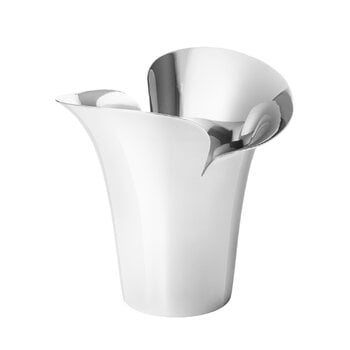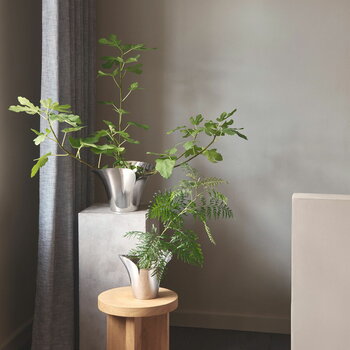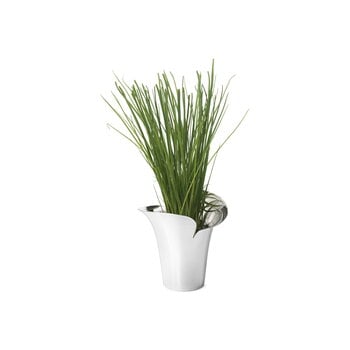Georg Jensen’s striking Botanica flower pot from the Bloom collection is designed by Danish Helle Damkjær and created based on a unique hand-made design in clay. The minimalist, organic form of the Botanica flower pot captures a tender flower in mid-bloom, creating an interesting contrast to the intensity of the stern, mirror-polished steel. The Botanica flowerpot is an eye-catching styling piece, whether it stands empty or offers a stunning home for a lush plant.
Bloom Botanica flower pot, XS, stainless steel
Georg Jensen
Description
Georg Jensen’s striking Botanica flower pot from the Bloom collection is designed by Danish Helle Damkjær and created based on a unique hand-made design in clay. The minimalist, organic form of the Botanica flower pot captures a tender flower in mid-bloom, creating an interesting contrast to the intensity of the stern, mirror-polished steel. The Botanica flowerpot is an eye-catching styling piece, whether it stands empty or offers a stunning home for a lush plant.
Product details (7)
- Material
- Mirror-polished stainless steel
- Colour
- Steel
- Height
- 12 cm
- Diameter
- 12.5 cm
- Size
- Bottom inner diameter: 5.5 cm
- Capacity
- 0.22 l
- Care instructions
- The pots must be washed by hand in warm soapy water and dried immediately.
- Product ID
Designer
The Danish Paris-based designer Helle Damkjaer has done many successful cooperations with luxury brands in New York, Tokyo, Paris and Copenhagen. Minimalistic functionality and the beauty of form are in the center of Damkjaer’s works. Many of her designs have won different awards and the Bloom bowl she designed for Georg Jensen can be found in MoMA in New York.
View all productsReviews (0)
Sustainability
The Product Sustainability Framework, our criteria of sustainable design, helps you find the most sustainable products in our selection. Read below which sustainability criteria this product has met.
Working conditions & labour 9/9
-
Equal opportunities for all employees
-
Commitment to UN Global Compact, fair compensation for all employees
-
Corporate responsibility requirements defined and communicated for suppliers
-
Systematic work for improved inclusion and well-being in the workplace
-
Transparent supply chain
-
Suppliers' compliance to a code of conduct ensured
-
Direct suppliers audited and certified
-
Compliance to the UN Guiding Principles on Business and Human Rights ensured in the supply chain
-
Support for community involvement in the supply chain
Eco-friendly production 6/9
-
Fair and resource-wise water-use in production
-
No incineration or landfilling of returned items
-
No use of endangered species as materials
-
No direct environmental emissions or waste (excl. GHGs) from production
-
Material-efficient and ecological packaging
-
No potentially harmful chemicals used in own production
-
The sustainability of direct suppliers' production is addressed and monitored
-
Production and material sourcing that respect biodiversity, animal rights, and natural ecosystems
-
Positive impact on nature’s well-being through operations that regenerate natural ecosystems
Climate impact 4/8
-
Company's direct greenhouse gas emissions identified and commitment to reduction
-
Product's carbon impact identified and commitment to reduction
-
Guidance on energy- and eco-efficient use of the product
-
Contribution to climate initiatives beyond the brand’s direct operations
-
Low-carbon or compensated transportation
-
Carbon footprint of the product calculated and goals set to reduce it
-
100 % renewable energy in own production and operations
-
Carbon neutral or carbon negative product
Sustainable materials 5/6
-
Sustainable and long-lasting material choices
-
No harmful or hazardous substances
-
Responsible raw material sourcing and production
-
Materials suited for circularity: monomaterials, recyclable finishings, renewable or recycled contents etc.
-
Ecological materials: natural, biodegradable, recyclable or recycled contents
-
Outstanding materials in terms of innovativeness, responsibility, sustainability and circularity: local production or sourcing, 100 % recycled content, C2C-certification etc.
Circular design 4/5
-
High aesthetic quality promoting long-term use of the product
-
Technically durable product design and material choices
-
Design for enduring life-long quality
-
Design and support for product maintenance, repair and upgradability
-
Innovative circular design solutions: circular service system, resale platform, remanufacturing, collection of used products, etc.










